Boris Johnson Resigns as Tory Leader
He plans to hang on as PM through the fall but likely won't be able to.
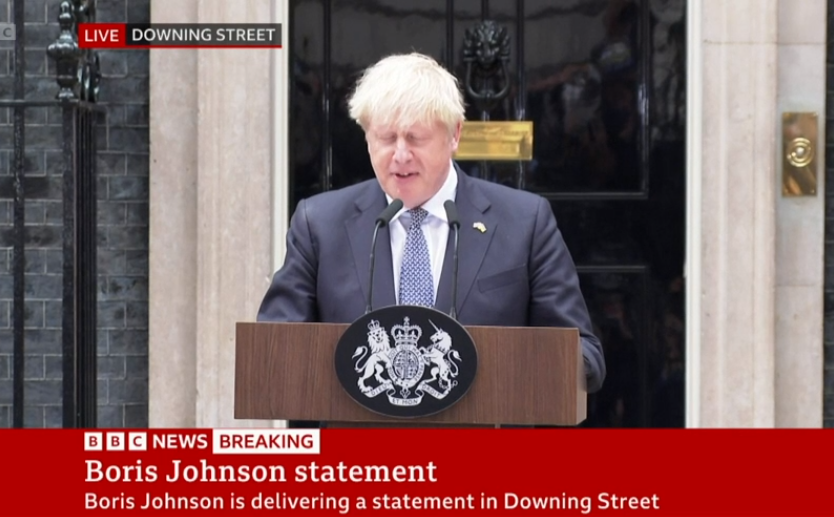
BBC BREAKING (“Boris Johnson to resign as Conservative leader“):
Boris Johnson is to stand down as Conservative Party leader, but intends to carry on as prime minister until the autumn.
He plans to stay in Downing Street until a new Tory leader has been elected to replace him as PM.
And he has begun appointing new ministers to replace the ones that quit in protest at his leadership.
But some Tory MPs are urging him to leave as soon as possible to avoid government paralysis.
Former minister Sir Bob Neill told MPs there was a “serious question mark” over how long a “caretaker” prime minister could stay in place.
“Might it not be in everybody’s interest to speed up the transition as much as possible?” he added.
Sir Keir Starmer said that if the Conservative Party did not “get rid” of Mr Johnson immediately then Labour would bring a vote of no confidence “in the national interest”.
“We can’t go on with this prime minister clinging on for months,” said the Labour leader, adding: “He needs to go completely… he’s inflicted lies, fraud, and chaos in the country.”
A vote of no confidence would be held in Parliament – if the government lost the vote that could lead to a general election, but this would require a significant rebellion from Conservative MPs to back a Labour motion.
It follows a dramatic 48 hours which saw dozens of ministers – including chancellor Rishi Sunak – resigning in protest at his leadership.
Mr Sunak’s replacement as chancellor Nahim Zahawi was among the ministers urging the PM to quit.
Mr Johnson resisted the calls until Thursday morning, when it became clear that he had lost the confidence of his MPs and that the government could no longer function.
Attorney General Suella Braverman and leading backbencher Steve Baker are the first Tory MPs to declare a leadership bid, with others expected to follow.
Less than three years ago, Mr Johnson won an historic landslide victory in a general election – but he has been dogged by controversy in recent months, including a fine for breaking his own lockdown laws.
The revolt this week was triggered by revelations about the prime minister’s handling of sexual misconduct allegations against former Deputy Chief Whip Chris Pincher.
BBC political editor Chris Mason said Graham Brady, the chairman of the 1922 Committee of backbench Tory MPs, has met the prime minister to tell him he has lost the confidence of the party.
WaPo (“Boris Johnson expected to resign as party revolts, but plays for time“) adds:
In fast-breaking news, Johnson has reportedly agreed to resign as leader of the Conservative Party, but hopes to stay in office until the autumn. During that time, the party would pick a new prime minister to replace Johnson. There would be no general election.
There was immediate and fierce pushback to that idea from some lawmakers and party grandees who warned that Johnson was soiling the Conservative Party brand and that he was too damaged to stay in office through the summer.
Johnson’s former top aide and now chief critic, who helped his boss win the Brexit referendum and get elected, warned that the prime minister needed to go now. In a tweet, he urged the Conservative Party to “Evict TODAY or he’ll cause CARNAGE.”
Dominic Cummings said that Johnson even now is “playing for time” and will try to stay on if he’s allowed to remain in office until the fall. “He doesn’t think it’s over,” Cummings said, adding that Johnson still is plotting, thinking ,”I can still get out of this, I got a mandate, members love me, get to September…”
As the world watched the British government unravel, the defense secretary, Ben Wallace, stepped forward to assure Britons that they were being protected. Wallace tweeted: “A number National Security Ministers are directly involved in authorising, on a daily basis, operations to defend the UK & its citizens.”
Wallace added, “a number of us have an obligation to keep this country safe, no matter who is PM.”
Keir Starmer, the leader of the opposition Labour Party, told the BBC that Johnson “needs to go completely, none of this nonsense about clinging on.”
By midday, Johnson was appointing new members to his Cabinet to replace those who had resigned. He is doing this to keep government functioning — but also perhaps to bolster his own position and convince his party that he should remain in office until a replacement is picked.
It was unclear when exactly Johnson would give his address, but broadcasters, for hours on Thursday morning, pointed their cameras at the famous black door of 10 Downing Street, the prime minster’s office, and waited for Johnson to step outside.
Johnson is not the first Conservative leader to have been shoved aside by his own party, which is famous for ditching its leaders quickly when they are no longer an asset. Even Winston Churchill resigned — after being given a gentle push — as his health declined in his later years.
Johnson’s predecessor, Theresa May, was forced out after she was unable to get her Brexit deal through Parliament following opposition within her own party, including from Johnson. May managed just over three years in office — Johnson has ruled for just under three years.
Johnson woke up Thursday morning in Downing Street, which is also his residence, to another wave of resignations by government officials and party members declaring that the embattled prime minister must step down immediately — for the sake not only of his Conservative Party but for the country.
Before the breakfast shows on television were over, there were 53 resignations, including four Cabinet ministers in just two days. Many of the letters included brutal assessments of Johnson’s tenure and critiques of his honesty. Some pleaded with him to go.
Nadhim Zahawi, who on Tuesday was appointed chancellor, the second-most important job in government, turned on Johnson on Thursday and told him to step down. He tweeted: “Prime Minister: this is not sustainable and it will only get worse: for you, for the Conservative Party and most importantly of all the country. You must do the right thing and go now.”
BBC political editor Chris Mason’s analysis (same link as above):
Is it sustainable for Boris Johnson to carry on as prime minister until the autumn?
His supporters will argue that offers some semblance of continuity and stability at a time where there’s not much of either.
Critics, such as Scotland’s First Minister Nicola Sturgeon, are already arguing it isn’t sustainable, given the huge number of vacancies in government.
Labour also think he should leave as prime minister now and there should be an interim prime minister until the autumn.
That argument will rage today.
And another will begin: who should be our next prime minister?
Liberal Democrat Leader Sir Ed Davey said it had long been clear Mr Johnson was “unfit to lead our country”, adding the “public won’t forgive the Conservatives for propping him up for so long”.
In a tweet, Scottish First Minister and SNP leader Nicola Sturgeon said there was a “widespread sense of relief that the chaos of the last few days (indeed months) will come to an end”.
It appears that Johnson will make his announcement at 12.30 BST, which is 15 minutes from now (that is, 0730 EST).
Another BBC feature, aptly titled “Boris Johnson resignation: What happens now?” reminds us,
Once a Conservative leader has stood down, an election for a new party leader is triggered. Under the current rules, candidates need the support of eight Conservative MPs to stand.
Once all the candidates have declared – if there are more than two candidates – Tory MPs will hold a series of votes until only two remain.
● in the first round, candidates must get 5% of the votes to stay in the running (currently 18 MPs)
● in the second round, they must get 10% (currently 36 MPs)
● in the following rounds, the candidate with the least number of votes is eliminated
When two MPs are left, all Conservative Party members around the country – so not just MPs – will vote for the winner.
The timescale for each contest is decided by the 1922 Committee of backbench MPs, and the committee could vote to change the rules before the contest takes place.
and provides this handy-dandy graphic:
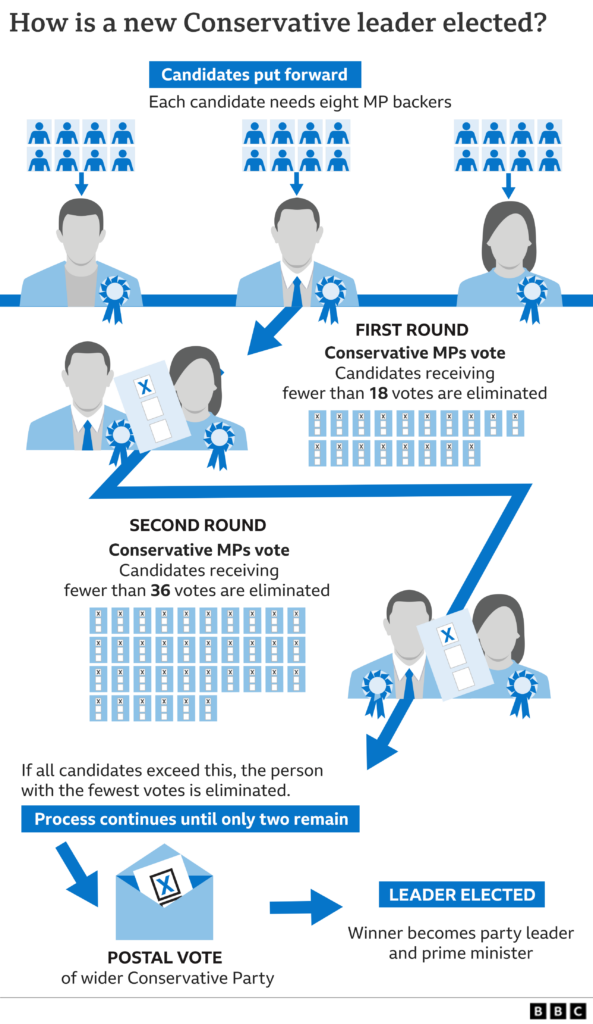
Overall, this is quite the chaotic process. The party has gone through multiple leaders since the disastrous Brexit referendum.
Johnson led them to a huge win in the 12 December 2019 general election. In our system, he would be entitled to ride it out and see if he can recover for another year and a half. Certainly, US Presidents have been wildly unpopular this far out from an election and gone on to right the ship. If our system allowed party leadership to oust a President they were unhappy with, one could imagine more serious clamoring than the various “Dems in disarray” reports to replace Joe Biden with a younger, more dynamic leader.
At the same time, Johnson is clearly ineffective and this system gives the party—and the British people—an escape valve. We were stuck with Richard Nixon and Donald Trump far, far too long. In a different system, they could have been replaced and the country could have gotten on with it much more quickly.
Obviously, the whole structures of the two systems are different. The UK has a parliamentary system and, despite the framing, the people vote for a party, not a person. The party that gets the majority—or can put together a governing coalition—gets to appoint a PM, subject ostensibly to the monarch’s approval. We elect Presidents, Senators, and Representatives separately, so fixed terms make more sense. But there’s something to be said for being able to dump leaders that the followers have lost confidence in.
UPDATE (0738): I listened to Johnson’s statement and was struck by how normal it was. Despite the obvious comparisons with Donald Trump, from the unorthodox personal style to the bizarre hairdo, it was a statesmanlike speech from a man who was experiencing a humiliating personal failure and losing the post he had spent his entire career seeking. In that moment, he put queen and country above all that. Thus, he went the route of Gerald Ford, Jimmy Carter, George H.W. Bush, and even Al Gore rather than that of Trump.
UPDATE (0748): Multiple sources are noting that Johnson’s tenure will be among the shortest in the modern era. The Telegraph:
Boris Johnson’s resignation today puts him among the top four shortest serving British Prime Ministers in the post-war period – and means he has lasted less time in office than Theresa May.
Mr Johnson became Prime Minister on 24 July 2019, and has therefore been in post for two years and 348 days.
In comparison, Theresa May, who became Prime Minister in 2016, served for three years and 12 days until 2019.
He would obviously surpass May were he able to hold out until the fall. Nobody thinks he will.
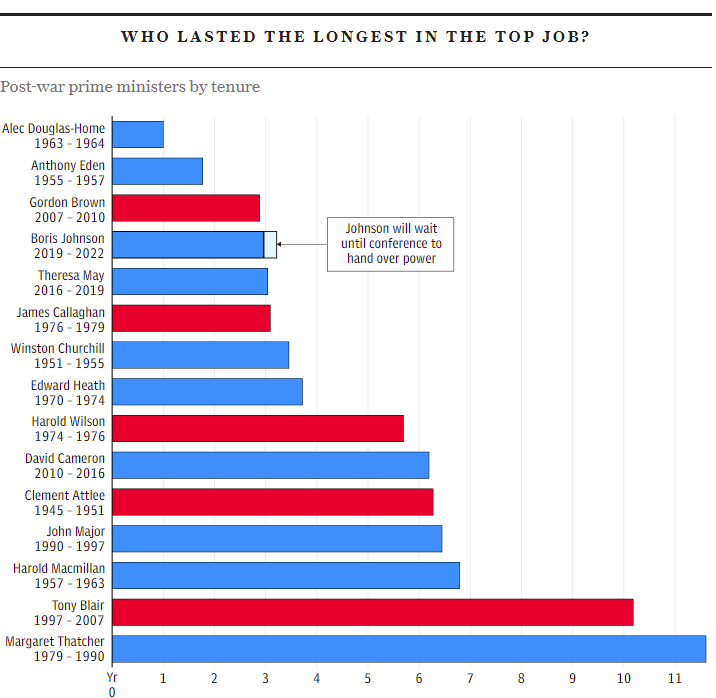

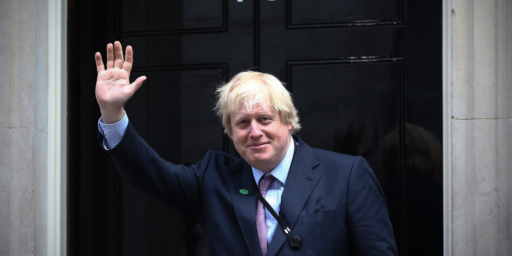

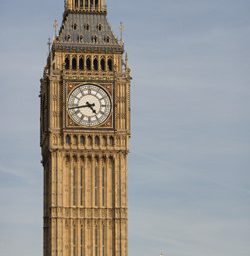
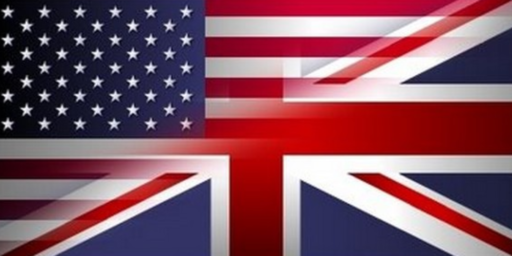

Proving again that you can do anything reprehensible, immoral or illegal as head of a conservative party as long as you don’t imperl the reelection of party legislators. It’s the only jobs program they actual care about.
From what I’ve read, even as delusional as he is, he will have to relent to reality by the end of today.
Of the major NATO members, the UK’s support for Ukraine has been the most enthusiastic. How much of that was due to Johnson and how much to prevailing opinion in the UK?
JohnSF should be along soon with his informed perspective.
Surely that’s a typo. Brady would have to be at least 125 years old. Or… is “the 1922 Committee” a name rather than a date?
@Mu Yixiao:
It was formed in 1923, but it exists today as a collective representation of the views of the party rank-and-file.
@Dave Schuler:
In the last two weeks it has become a bit of a meme that if there’s about to be a piece of breaking bad news for BoJo, an announced phone call with Zelensky was soon to follow.
@Mu Yixiao: From Wikipedia:
@Mu Yixiao:
The witticism has already been written: England and America are two countries separated by a common language.
@CSK:
*tips hat*
More like guesswork a lot of the time than particularly well informed, I’m afraid.
@Dave Schuler:
British support for Ukraine is strong and widespread.
You can spot Ukraine flags flying outside country houses and public houses, as a trivial example.
In this matter, Johnson is, as often, more a follower than a leader.
The UK military support programme, Operation Orbital, is far more Defence Secretary Wallace’s project, than Johnson’s.
I did like the comment from the Labour head earlier: “this is the first time the sinking ship has left the rat.”
I will reiterate that a democratic country can rid itself of a troublesome leader without tearing the country apart.
Possibly (and I am not sure that would be a bad thing). Although despite the cliched reporting, I don’t see enough support in the party to oust him.
@Dave Schuler:
Perhaps rhetorically, but the UK has also been stonewalling on accepting refugees, and in terms of military support it’s hard to beat the eastern European countries. Estonia, for example, sent Ukraine a third of Estonia’s entire military budget
@Stormy Dragon:
It’s notable in polling the government is often seen as not going far enough to support Ukraine refugees:
41% not enough visas, 30% about right, a mere 9% “too many”
63% favour visa free access for Ukrainians
In anecdotal terms: both my brothers are currently accommodating Ukrainian refugee families in spare rooms.
There are at least three families I’m aware of being hosted on my estate (neighbourhood as I think you folks would say).
The government is definitely lagging the people on this matter: IMO because they want to avoid creating precedents that would annoy their base re. other categories of refugees.
This brings up some nice opportunities for mischief. If I were an MP, I would be being very quiet to try to get a ministerial position, and then resign that position an hour after being named.
He’s gone through so many that he really can’t be that picky or do a lot of vetting.
Dr. Joyner:
Going to have to disagree about Johnson’s speech.
Granted, it was not a Trumpesque rant of incoherent rage.
But in content it is appalling; at least to someone alert to its violations of British constitutional norms.
He is being reported as having “quit” and “resigned” but what he actually said is:
That is, he merely conceded that a new leader/PM will be elected at some time.
It cannot be said often enough: a Prime Minister does NOT have a personal mandate, he does not have some mystical leadership of “you, my people” which entitles him to rule as he sees fit.
Not to mention the fact, so inconvenient for the myth of Johnson the political genius, that he won in 2019 on a swing of just 1.2%; 13,966,451 compared to 13,636,684; a mere 329,767 votes.
Against Jeremy Bloody Corbyn!
Then a load of boostertism about his record, including the claim of
It’s more like a victory speech than a resignation!
And then:
So he insults those he drove to rebellion, after long provocation of unrequited loyalty, and has the affrontery to label them “eccentic” and driven by “herd instinct”
What does he not say?
“Sorry.”
Good riddance.
And let’s hope the Conservatives are not fooled by “I just want to stay until Conference, honest” act. If he sees a chance for mischief, he’ll leap at it.
With Johnson, always check the small print and count the spoons.
They should have finished him off; or at least insisted that he NOT appoint a Cabinet of his own choosing.
@JohnSF:
Well, Johnson spoke in complete, coherent sentences, and he didn’t call for an enraged mob to storm and ransack Parliament. There’s that.
@JohnSF:
IYO, was there a key reason for Boris’s fall from grace? Doesn’t appear to be anything to do with Ukraine to me.
edit test@CSK:
True. I’m grateful for such not-so-small mercies.
One thing is, that though Johnson has combined with a sizable element of the Conservative Party-in-the-Country, and MP’s/Ministers (a hard core of about 60 are still his “die hards”), he has not twisted them as deeply and widely as Trump tainted the Republican base and electeds.
latest polls show 50 to 60% of Conservative supporters wanting Johnson to go.
The revolt of the ministers and “formerly loyal” MP’s was in part a desire for self-preservation; but also I think, at least in part, that even some Leaver hard cases were just sick of both the deviousness, and the failure of a distracted and lazy PM to address serious domestic issues.
Unlike US Republicans, when it came to the decision point, revolt was seen as better both as politics and for self-respect.
And to give Johnson his due, despite his scofflaw tendencies, he retains either enough regard for the Country, or at least awareness of the weakness of his own position, to avoid a head-on assault on the basic norms.
Johnson and his Inner Cabinet aren’t as stupid, malignant or crazed as the Trump circle of January 16. And the forces of normalcy are rather stronger.
But it’s a possible warning for the future; we need to consider possible codifications and reforms of the “unwritten rules”.
@dazedandconfused: Johnson has pissed off sufficient members of his party who have supported his announcements about “what happened”, then left with egg on their faces when the next day someone comes out with proof that Johnson was lying his head off.
Basically, the man is an acute liar and nobody wants to yoke his/her own reputation to Boris.
@JohnSF:
I think there are no primary elections in the UK.
@JohnSF:
“There are at least three families I’m aware of being hosted on my estate”
Just when we’re thinking that you live in a castle, you spoil it.
@grumpy realist:
Politicians disgraced for telling whoppers? How quaint!
@dazedandconfused:
Certainly wasn’t Ukraine. It’s about the only area of policy where there is a genuine national consensus.
As I said above, Johnson is more a follower than a leader on this, but an adept enough follower to retain the favour of both the general public and the “Establishment”.
There has been criticism of the tardiness re. refugees, but it is neither strong enough nor salient enough to ignite a Parliamentary revolt.
Basically, it’s the continual, repeated, lying and deviousness over various scandals.
Above all the whole “Partygate” saga.
Which left MP’s defending a Number 10 “line” that kept shifting as journalists or official reports overturned one story after another.
It was just humiliating; and, in old-fashioned terms, dishonourable.
Plus the ongoing erosion in the polls, and recent by-elections, due to the combination of scandals, deceit, Brexit backfires, and mounting economic troubles.
Especially as Johnson is now shown in polls and focus-groups as a drag on the Conservatives, not an asset, even among the working class Leavers, to whom he had been seen as having a special appeal.
Finally Conservative MP’s patience snapped.
Best I can suggest for a fuller narrative is to check out the more in depth accounts at the BBC, the Guardian, New Statesman, Economist, FT, Huffington Post UK, or similar.
Secretary of Defence Wallace is now seen as one of the leading candidates to replace Johnson, due to his organisation of support for Ukraine.
When before the invasion he was “Ben who?”
(My personal bet as of now is it will either be Liz Truss or Penny Mordaunt; other main contender being Rishi Sunak.)
@Kathy:
Depends on how you define a primary.
It’s entirely a matter for the Party concerned if they have them, who votes, how organised.
Labour have votes of constituency membership for candidates.
But, those voting are solely paid up party members.
And the candidates are vetted by the Party.
Conservative candidates are usually selected by a constituency association committee.
In both, party members are subject to party discipline and can be expelled for a variety of offences; again, solely internally determined.
As for leaders, both Labour and Conservatives now have similar systems: MP’s vote for for intial candidates.
Labour have all over a certain percentage (complicated) put up for membership vote by AV preference ranking.
Conservative have the top two go forward for membership vote; and MP’s can short-circuit the process by presenting only one candidate, as in 2016.
My personal view: leaders should be elected solely by MP’s and membership votes should be forbidden by law.
Though of course, in the UK, Law binds so long as it binds: a ruling party could overturn a law at its pleasure.
The Sovereignty of Crown in Parliament is absolute when not constrained by treaty.
“No Parliament may bind another.”
@dazedandconfused: as JohnSF says there’s been a build up of anger and disillusionment, but the most immediate trigger over the last week was that:
– a member of the Whips office (Chris Pincher) resigned the day after an evening getting drunk and unwantedly touching up a young man in the Carlton Club. Pincher was a Johnson ally who’d worked on his leadership campaign
– He wasn’t sacked from the Conservative parliamentary party immediately. Johnson’s response was basically ‘well he’s said sorry and quit his whips post, so that’s that’
– It then became apparent that Pincher had a long history of this sort of behavior. The PM’s spokesperson denied Johnson had known about this when he appointed him to a job. Ministers were sent out on TV and Radio to repeat this line.
– The line turned out to be false. Johnson knew, he was verbally briefed before he became PM when Pincher was a foreign office minister in his department. He just didn’t care because the person was on his side. The former civil service head of the foreign office that had investigated Pincher confirmed publicly that the No. 10 line was false. Media shitstorm ensued. Later that day the resignations started.
@Chris: … but it’s not the case that that incident by itself is particularly egregious by Boris Johnson standards. It’s just the latest straw that broke the camel’s back for MPs and was a decent excuse to actually bite the bullet and get rid of him.
@Sleeping Dog:
LOL; estate in my case being former “Council Estate”.
As with much former municipal housing sold to owner-occupiers (and a small chunk of housing association rentals) in the late 1980’s. Total population of the former council housing area c. 2,000.
The picture at the top right of that Wikipedia page is actually very similar to my house; but a bit larger.
Looks to be the 3 or “2 1/2” bedroom type, whereas mine is 2.
The cabinet has agreed that Johnson will stay on as “caretaker” PM.
@JohnSF:
I think all that qualifies as “no primary elections.”
@Kathy:
Short version 😉
@CSK:
That being the Cabinet Johnson was allowed to appoint!
FFS, yiz Tories!
Sometimes the Conservative Party shows all the well honed killer instincts of a toothless, elderly two-toed sloth after a heavy meal with wine, and no coffee.
When you have someone like Johnson on the ropes it’s stab, stab, stabbity-stab time.
Not a handshake, a gentleman’s agreement and a graceful exit.
Amateurs.
@JohnSF:
Thanks.
@JohnSF: Fond memories! My grandfather and grandmother lived in a place like the one in the picture when I visited them in Belfast with my mom in 1969. I probably have pictures somewhere.
@JohnSF: But doesn’t this just show that your father’s warning about the Tory sneaking up behind you to put his finger on the scale applies to intra-party workings as well as dealings with the general public?
(And you’re right on the stab, stab, stabbity-stab part. No dishonor in backshooting a polecat.)